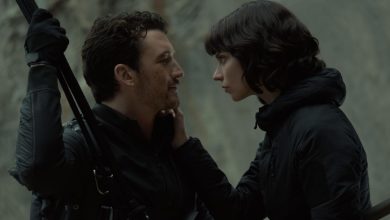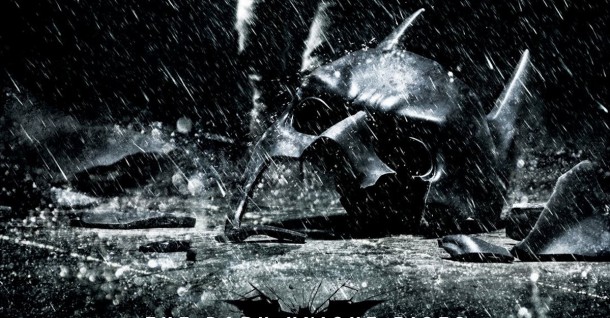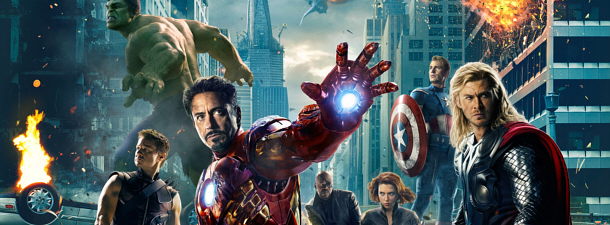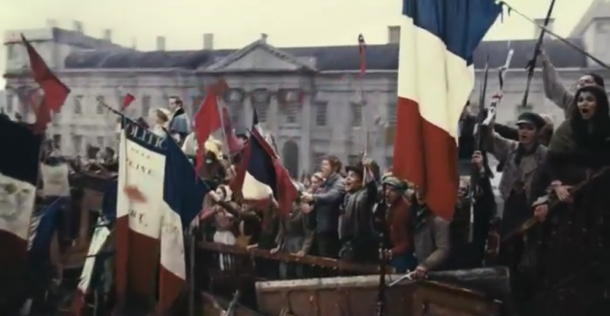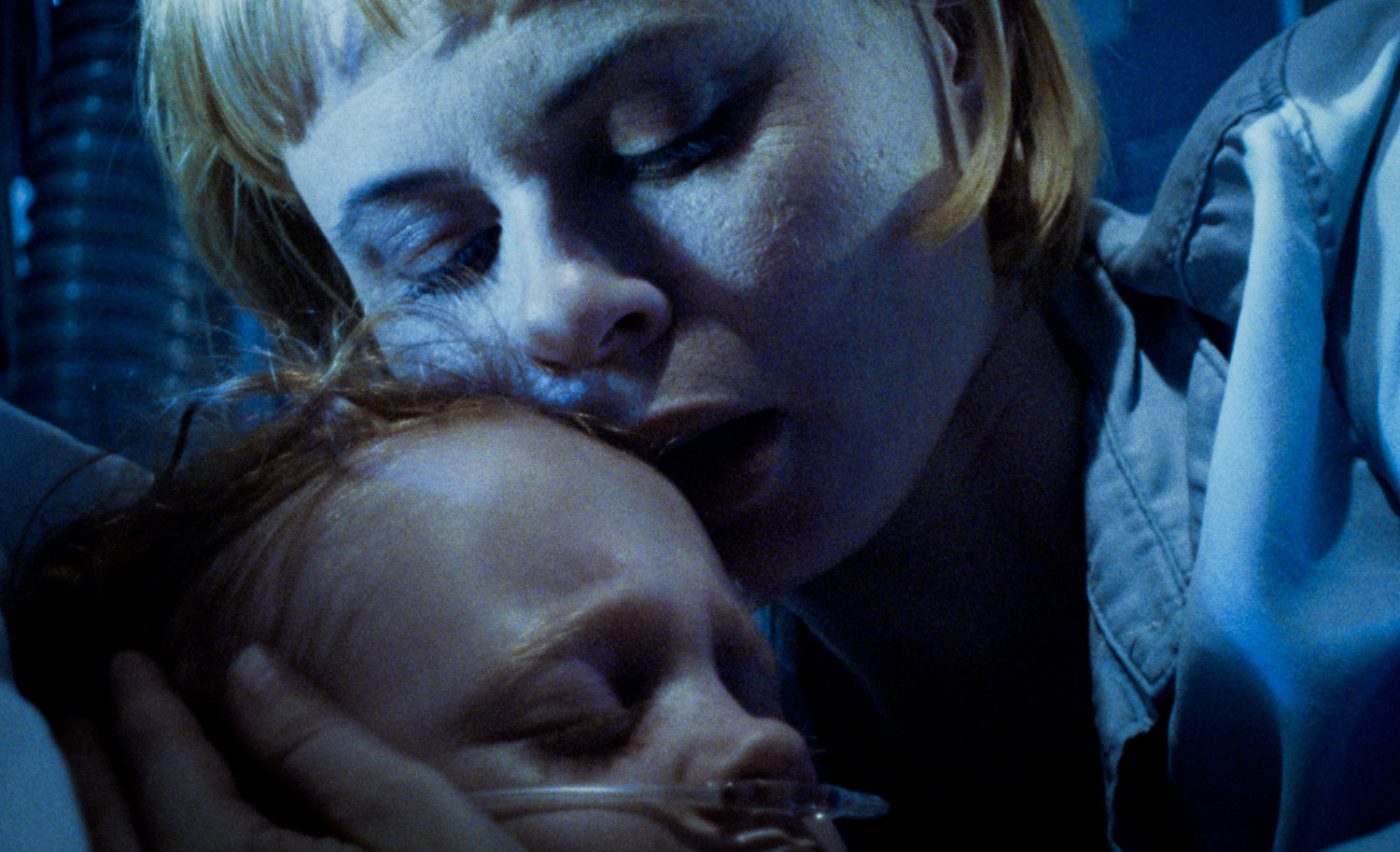Interview With Prolific Character Actor Lew Temple
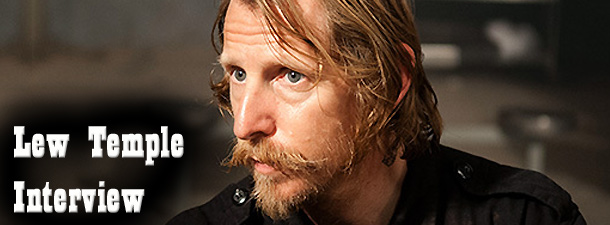
Lew Temple, most recognized as Axel from The Walking Dead, is an actor with the ability to sink into his roles and become a completely different person, stamping his own mark on all the characters he portrays. With a variety of work under his belt, he shows no sign of slowing down and continues to be one of the most prolific character actors in the business. Recently, he sat down with Nicole to discuss The Lone Ranger, Axel’s untimely demise, his upcoming projects, his thoughts on the hero’s journey and becoming a well-known name in Hollywood.
This is part one of a two part interview. Click here for part two.
Hi and welcome to Movie Vine, Lew. To start out, let’s talk about The Lone Ranger. What can you share about the experience of making that movie? It’s really a once of a lifetime piece of work.
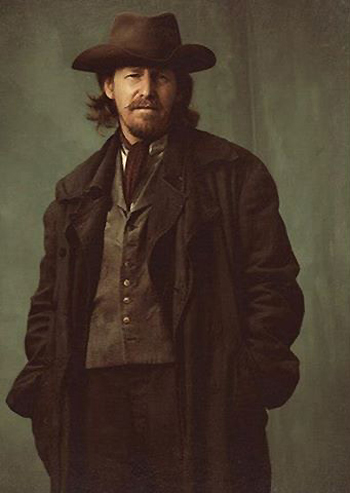
Lew: This movie is epic. I mean, this will absolutely delight all families, all action fans, all adventure fans. This is going to be the summer blockbuster, I promise. It’s so exciting. I can tell you that Gore [Verbinksi] and Jerry Bruckheimer and Johnny Depp along with the rest of us, including Armie Hammer, spared no pound of flesh and this movie is so amazing. It comes out July the third and I’ve only seen trailers. I’ve gotten some emails from Gore that says that it’s crazy, it’s amazingly fantastic. I’m just really thrilled. It was such an adventure for me personally to be on a horse for three months, just sitting on a horse and riding everywhere. And not just to be on a horse but to be on sacred ground.
Both Native American sacred ground like burial grounds and ancient ruins in places like Monument Valley, Utah but also to be on cinematic ancient ground that John Ford and John Wayne shot Stagecoach on, we crossed rivers from the movie, The Red River, and we rode through plateaus from Tombstone. All the great westerns we became part of. And for me to be on a horse and doing that; riding ten miles in as opposed to being on a tourist trail was really what the movie was for me. I know it’s going to be great but the experience of the movie for me is everything. I rode with the group of guys that included the actors but also the wranglers, the stuntmen; I mean, we just became a band of brothers that was forever memorable. I left The Lone Ranger saying to myself that I’ll never do anything but a western. I went from riding a horse to eating one in The Walking Dead. It’s funny how things spin on you.
The Lone Ranger was just such an experience that I can never duplicate. We went through cowboy camp to prepare us. So we were [doing] three weeks of roping and riding and shooting and mucking out stalls. I didn’t even want to go out and do the movie! I was just content being out in the bunkhouse., doing chores. It was just this type of thing in this day and age that you don’t get to do. I hope I get to do it again but having the opportunity to have done it once at least at that level, at the largest level of my generation, I’m very honored and excited. That’s a lot of Lone Ranger for you but I’m telling you, it’s that big. This movie is epic. They went on to shoot, I think, nine months. I’d been doing The Walking Dead when I got invited back into Los Angeles at Johnny’s wrap way back…you know, I left in May and I think in October, I came back to say goodbye to Johnny on his wrap day. That was ten months later! So it’s a big movie and I have no doubt that Gore will not disappoint.
MV: I’m very excited to see it.
Lew: You should be! I haven’t seen it but I’m scheduled to go to the premiere on the 22nd of June. And there were some great guys to work with. Obviously Johnny Depp. Armie Hammer is this amazing talent who has such a free spirit. He’s tall and handsome and he can ride a horse, play the guitar, fly an airplane, ride a motorcycle. I mean, and he’s got a beautiful wife and he’s wealthy. I mean, he’s like the Great Gatsby, you know?
MV: Oh yes, that’s a good description of him!
Lew: And then of course, Johnny is just the ultimate chameleon character. Super nerd, cool, handsome, all those things. So it’s really a wonderful energy. But there were some other people that I got to meet: James Badge Dale whom I’m a huge fan of; he’s delightful. Helena Bonham Carter is always fun, she’s fantastic as is William Vickner and Tom Wilkinson. And this group of desperados, these marauders, they’re headed up by Vickner and it was crazy. It’s really exciting.
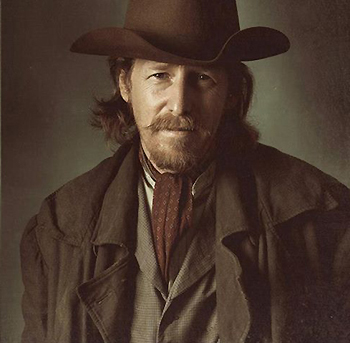
MV: So your character, Hollis, is part of the rangers. Now, this is a western: did you like playing the good guy or did you want to play a bad guy?
Lew: This was great. It’s always more fun to play the villain particularly on a big action adventure because you’re causing the problem and someone’s chasing you. It goes right back to old schoolyard premise of hide and seek or capture the flag or tag you’re it. And everyone likes to be chased. That’s the build of a villain, that’s the delight and fun. But in this instance, we were very cohesive as a unit. I really appreciated our bond that we had. We were a unit, this group of rangers and not just a unit on camera but off. It was very appreciated; it was very dear to me. It still is. They’re the men I’ll always have as friends and take my family camping with and I’ll always have them. People ask me what I take from the movie and I say five great friendships that are lifelong. So yes, I enjoyed actually being the stalwart, tall lawman that just followed the marching orders to go out and do right. And so there was a lot of nobility to that. Sometimes, I get the opportunity to play the other side, the left side of the line, where I erase those lines of nobility and just serve myself.
But this was serving the common good so I actually enjoyed it. And in a very different way, heroically, as being part of the unit and not being an individual where as in Unstoppable where I’m a bit of a hero, helping save the train, I do it sort of as a man on my own, a man on a mission and this would be a unit on a mission. I just came to really appreciate riding in formation, looking out for one another, pulling pistols, knowing that one of the rangers has my back. That was just all very supportive of what we were doing.
Had we done the outlaws, I think that would be very exciting and they were great as well but I think I would have missed out on this unit, this body of guys that I came to know so I’m really happy and appreciative getting the chance to be part of that because I think typically I would be cast as the squirrelly, kind of odd, on the fringe [character] as opposed to the dressed down, by-the-book law guy.
MV: It’s always good to play against your type. I think you could do both: you have the look for a good cowboy and a bad guy at the same time.
Lew: I seem to, I seem to have both well within me. So this was that opportunity and I thank Gore for that.
MV: And it’s funny, this isn’t the first time you’ve been in a story with a guy, who’s still a good guy but who had to go an unconventional route to do good things like I’m thinking of The Walking Dead. I’m thinking of Rick Grimes, he’s still a good guy and then something happens and he ends up occasionally doing not quite on par things to still do what’s right.
Lew: I think that is essentially the hero’s journey. I think Superman has that. We’ve got that thing: the Superman syndrome. Occasionally, where all expectations are for you to follow and toe the line, occasionally you just can’t and you have to just go out of the box or go outside of the rules and bend them. Or just totally break them unconventionally in order to accomplish and you make decisions what’s best for the greater good.
We do everyday with our households, we do it with our budgets, with our decisions for vacations or work. We are the both the protagonist and the hero in our own lives and no man can walk of his own story or his own destiny. So we have to attend to it in our own different ways. And I think that people like Dan Reed and John Reed who are the brothers, John being the Lone Ranger, [that] have to do things that go against their moral fiber but they recognize this is my only place of success. And we all do that. I mean there’s times we rob Peter to pay Paul, we just have to.
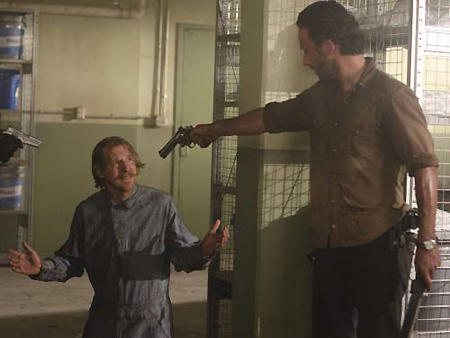
Rick Grimes clearly is someone who is well-intended and he is also somebody who is ultimately a very sensitive man though he’s cut that off on so many occasions. Clearly to have the time of emotions he’s gone through he has to have assess to those that he can’t overcome. We watch that, we watch the demise of his control of those emotions and the breakdown and the delusions and we recognize he’s a flawed hero. We all are. And so, I think that helps us connect and say I’m like that, I’m okay with that because I’m like that. I’ve cheated on my taxes, I’m sorry.
MV: [laughs]
Lew: Hey don’t tell the IRS that! I’ve drank. I’ve had an adult beverage and drove. I’ve run a yellow light, you know these things. So we’re okay with that. And a hero that is truly the hero is one who can understand their journey in that I’ve had to do that but it’s okay. And that’s what’s great about The Walking Dead, we’re erasing the lines which were gray, which are gray now. They were black and white starting in the 1950’s. Now there, in an apocalyptic zombie situation, morality becomes very vague. It’s okay to sleep with my best friend’s girl – wife – when he’s dead, oh, he’s not dead!
Well, you know what, what difference does it make? What is this marriage? What is this wedding? What is this bond? And then someone’s gonna stand up and say well if it is nothing, then we have nothing. Gotta hold onto something for the future and that’s our job now. We talk often on the set of The Walking Dead about memories and what our memories as adults are. We knew the world before this but think about Carl’s memories or Judith’s memories, Li’l Asskicker’s memories. What will they be, you know? And that harkens a certain melancholy. Bygone times for them may be, you know, running for their lives for the rest of their lives, trying to survive. Which is what that element is.
MV: Poor kids.
Lew: Yeah, it’s all the hero’s journey. I’m always excited about that.
MV: That is a fantastic way to think about it. Because I was ‘thinking is possible for him to still be a good person at the end’ and if it’s the hero’s journey, then the whole purpose is for him to become somebody different, still good, still an essence of good but something else that’s grown to accommodate this new world. So that’s an interesting way to put it.
Lew: Right. I think it’s an evolution, you know. And every man wants to evolve, if nothing else, through his children. To have them, as John Wayne said, “To be better than I was”. Every man wants his son to be a bit better than he was. And so I think that Rick at this juncture, starting season four, is gonna have to take a look at that with young hard charger who’s a killing machine and who’s just disconnected from so much and that’s just an interesting storyline. I’m excited to follow that one as a matter of fact.
MV: I was just going ask if you were still watching and if anyone’s still asking you about it. You know, I run into a lot of people that are still crying about Axel. I might be one of them.
Lew: Thank you, that’s so kind. Well, we wanted that to be a gut punch to the audience, no doubt about that. We wanted to pull the carpet out from underneath the audience. And so when it was presented to me, of course you do this denial dance. Whoa, wait, whoa –
MV: Why me! Why me!
Lew: Yeah, exactly. What about that other guy, you know? I could think of some solutions to get around this. At the end of the day, one of the things they were concerned about was that we’d been going along introducing characters and losing characters. They wanted to make sure the audience understood that this is a dangerous world: don’t get too attached. And I said, well, you’re gonna lose your whole – just shut the show down. You kill Axel off and I don’t think anyone’s gonna watch next week. So when you finally accept the absolute, that this is going to happen, then you begin to consider how you want it to happen and for me, I wanted it to be very honorable. I wanted to honor Axel’s undoing and his death. Glenn Mazzara was the showrunner at the time and he invited me into the writer’s room to help develop the story that we were going to provide. Where we wanted to go, for it to come as a surprise just as we were getting to know Axel and have that bullet in the head.
I was offered to become a zombie. I said no, hell no, I don’t want Carl to come out and put me down, no. I wanted to go out honorably and in some small way, to maybe have done his part to save Carol, not with only the one shot but with several shots. [laughs] They may have taken that and ran with it a little bit with all the shots that hit Axel. You know, every time they shot at each other, they missed but when they shot near Axel, they hit him. He was like a human sand bag.
MV: But you did your part!
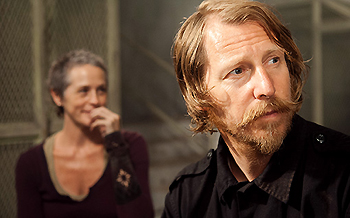
Lew: I did my part and I was very proud of that. You know, Lew Temple will go on to work hopefully but I will say there’s a lot of disappointment for not being able to carry Axel through because I thought he had a lot more to do for The Walking Dead. I thought that he was going to provide some levity, a little lightheartedness that he had a tendency to do. I thought he would provide some friendship, maybe even a little more comforting friendship to someone like Carol. But even Daryl. I think there was a place if Daryl could get over the idea of me having a relationship with Carol. I thought Daryl and Axel could talk about crappy brothers.
I’m quite sure Axel and Herschel could have old boy conversations about the bygone days. I feel like Axel had an axe to bear or grind, if you will, with Rick. And we actually did shoot this scene when the news that Oscar had been killed; that Rick took him out to get killed. And so we did a scene where Axel got up in Rick’s grill about that. But then what happened was that scene was very loaded. And Rick – Andrew Lincoln – has to go in and deal with the new people, with Tyreese and Sasha, and then see the illusion of Lori. And it just was too heavy so we had to play that back. But I think Axel had a problem with Rick taking Oscar out to get him killed.
I felt like Axel and Oscar had a really lovely chemistry and relationship. A sort of straight, dry sense of humor. It was a good partner team and so I liked what we were able to do, Vincent Ward and myself. All things, I was very disappointed not to be on the show, disappointed not to move Axel forward but also very proud of what we accomplished, very proud of how I felt like we honored Axel’s death and his departure.
MV: I think Axel, in the time that we had him, he came sort of as a bad guy, in a way. Or at least an unknown and by the time he left us, I think he had enough of an arc to be mourned.
Lew: Yeah, and you know, that was always the intention. It was that the show had asked me to reserve some fangs so to speak and keep them in the closet. In that if we do choose to run Axel out as a pedophile, murderer, rapist, [or] serial killer, that if we do have designs on that, we can pull that out of not just nowhere. So those were things. I mean at some point, he said was in for his pharmaceuticals and then he robs a place with a water gun. There’s a certain pathological liar thing going on there, you know, we’re not sure. And then the thing with Beth: is that interesting? Is it creepy? Or then we pull back and we say hey this guy’s just trying to warm up. Maybe he’s trying too hard to ingratiate himself with endearment. But at the end, I really wanted him to be well-liked and invited in and so that when he leaves, it would hurt. So, I’m pleased. Again, I felt that we did well and accomplished that.
MV: You completely succeeded. I still hear about it on the internet, every other day about Axel.
Lew: Like what the hoopty? Who did that? What? There’s no reason! Yeah, I do as well. Truly and honestly, I hear all the time about why did Axel have to go. But he was there and so you know, again, I’m happy. And you know, going into the work, I knew that based on understanding the comics…based on the graphic novels I should say in deference to Mr. Kirkman, that Axel was going away. I just didn’t think it was going to happen as soon as it did. I was looking for it to maybe carry over towards the end of season three for instance and/or carry into season four. But nonetheless, I made some amazing friends there. The cast and crew of The Walking Dead are exceptional. People ask me what do you take away and the thing I take away is hard work. Good old-fashioned hard work. These folks roll up their sleeves and get to work.
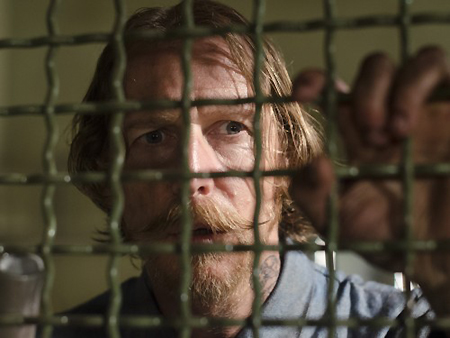
And they’re exceptional at not resting on their laurels. They show up every week as if it may be their last and that’s headed up by Andrew Lincoln. And there are no divas on sets. There’s no prima donnas or false pretensions. It is a hard-working group who genuinely cares for each other from the producers to the writers to the cast to wardrobe and makeup and hair and the camera crew to the editors and music and everybody is on board. And it’s really rare but I think it speaks to the success of the show. They’re just hidden away down there outside of Atlanta in Senoia, Georgia. And they’re not bothered by executives or studio frontmen. They just go to work and I was a part of that. I’ll always be part of that.
I still say ‘we’ and I still connect with the entire cast, you know. Almost daily I’ll get a text from Norman or Andrew or Emily Kinney or Melissa McBride or Scott Wilson. And really, you know, hey, hang in there, is it hot yet? Wait til August! And so all these things. It’s a very close group. I’ll never forget our first scene where the prisoners were revealed was to be exposed to Herschel getting his leg chopped off and that scene had been shot the day before. And that entire cast of that scene which was predominantly all the survivors – we hadn’t been introduced to Woodbury yet – they came in on their off day to reenact that scene full throttle so that we as the newbies could understand what the level of intensity was and what we were reacting to to get that holy crap [from] that very first opening line and that set the bar for me; that set the tone. And not just for me, but all of us. And we were invited to participate at that level and that speaks to the success of the show and as well as just great writing.
MV: It is an amazing show and you left a mark on it. I’m so glad to hear that it came together so well for you.
Lew: Thank you, I appreciate that. It was with a lot of mutual respect that we were able to continue on and connect. And I still go out and do fan shows with the rest of the cast.
MV: Yeah, I saw that. You’ve done a couple of conventions!
Lew: They’re always lovely. I like to refer to the fans as the audience as opposed to the fans because I think they’re very actively involved in the show. I think they inform the show as much as the show informs them. There’s this odd symbiotic osmosis that goes. And what the show needs, somehow, it understands through the audience and what the audience needs, the show will let them know in the form of killing a character off like Axel.
So I always really enjoy getting out to exchange with the audience. Sometimes I call them the fourth wall cast-member. Because they feel like they’re right there, giving the nod of approval or disapproval of what we’re doing or just being engaged. You know, again, I think the success of the show is going back to the hero’s journey; those lines of morality that are erased. I mean, don’t we all get up every morning in some sort of survival mode? Whether it be with our mortgages, our credit, our school. What are we gonna do? How are we going to? You know there’s a level of survival in our face all the time. And I think that’s where we connect and relate to this story. Who isn’t dealing with a parent or loved one that may be suffering through some sort of an ailment in the form of a zombie?
Aren’t the walkers a metaphor for cancer and AIDS and one percenters? Or debt? Just anything that we’re running from or fearful of. I think that’s where the show lands a lot more than the horror genre. I think that’s why it’s become bigger than that. It’s pop culture now. It’s popular culture as opposed to it being genre culture. I meet as many people that are accountants, reverends and housewives and wallflower girls that are fans of The Walking Dead as I do seventeen-year-old boys who ride skateboards and listen to heavy metal music. I dig them cats too. They’re the originals. That’s the fundamental horror credo. But at the end of the day, this is a show that appeals to everyone for all of the right reasons.
MV: Click here for part two.
In the meantime, The Lone Ranger is out July 3rd in theaters everywhere. Remember to keep up with Lew Temple on Twitter and Facebook and you can stay up to date with all of his projects on IMDb as well.
By Nicole Carter
